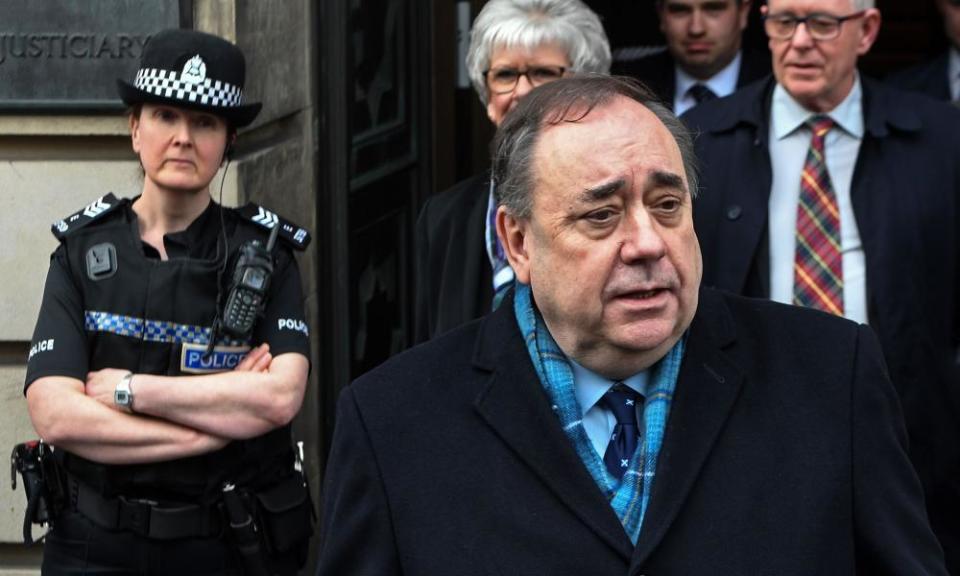The Guardian view on Alex Salmond: a battle ends, a battle begins

From the moment that Alex Salmond found himself facing allegations of sexual misconduct in office, it was clear his trial would have huge consequences. So it has proved. Mr Salmond is 21st-century Scotland’s most significant politician. The 13 cases of sexual offences involving nine women, mostly Scottish government or Scottish National party officials, were extremely serious. The former first minister has always been a “Marmite politician”, as his defence lawyer admitted to the jury last week, adding that Mr Salmond “could have been a better man”. Whatever the outcome of the trial, the consequences were likely to be explosive.
Mr Salmond’s acquittal on all counts this week ensures that. High on any list of the immediate consequences of such a high profile case is where it leaves women who accuse men of sexual harassment. That impact is likely to be compounded by Mr Salmond’s intention to take the fight to his accusers, and to attack senior figures in the SNP and the Scottish government, above all his successor, Nicola Sturgeon, whom he charges with conspiracy to remove him from politics. Mr Salmond may sue the Scottish government. He wants to put his case to a Holyrood inquiry. He is writing a book. His supporters are revved up. If nothing else, this is a difficult environment for victims.
The struggle between Mr Salmond and Ms Sturgeon can only generate problems for the SNP. But the battle draws energy from many other issues. Mr Salmond thinks Ms Sturgeon has become too cautious in her efforts to break Scotland away from the United Kingdom. Some of his supporters dislike Ms Sturgeon’s feminism and her backing for women and LGBTQ+ activists within the party. Many of Ms Sturgeon’s supporters dislike Mr Salmond’s bombastic style and his involvement with the Kremlin-backed RT broadcaster. It adds up to a bitter yet complex fight for supremacy, which will be fought out in multiple ways, including SNP candidacies for next year’s Holyrood elections.
There is nothing in this for the SNP. The party remains ascendant, as the 2019 general election confirmed. Its rivals are all in various states of eclipse. Yet the SNP has been in government since 2007. Its record on domestic issues is not one to boast about. Once the power struggle is resolved, the SNP will either be led by the woman who is responsible for that vulnerable record, or by the man whose pitch to the court, in the words of his own former speech-writer this week, was “I’m sleazy but not criminal”. Traditionally, voters punish divided parties.
We shall soon see if that rule applies to the SNP. If – and it is an enormous “if” – one or more of the opposition parties gets its act together better, the SNP could struggle to win the decisive majority in 2021 that it seeks in order to increase the pressure for another referendum.
Right now, all this awaits the outcome of the coronavirus emergency. All politics, even the SNP’s internal battle, has to defer to the public health crisis. Yet the Covid-19 lockdown will play its part when politics resumes. The crisis puts Ms Sturgeon in the spotlight, and she is handling it well – more surely and fluently, for many, than Boris Johnson in London. Yet it is also the UK Treasury, with its deep pockets and borrowing ability, that has stood behind the Scottish economy as the crisis has brought Britain to a standstill. Scottish voters will have to factor both realities into their view of the SNP that eventually emerges from its own incipient civil war and the national crisis that now engulfs us all.

 Yahoo News
Yahoo News 